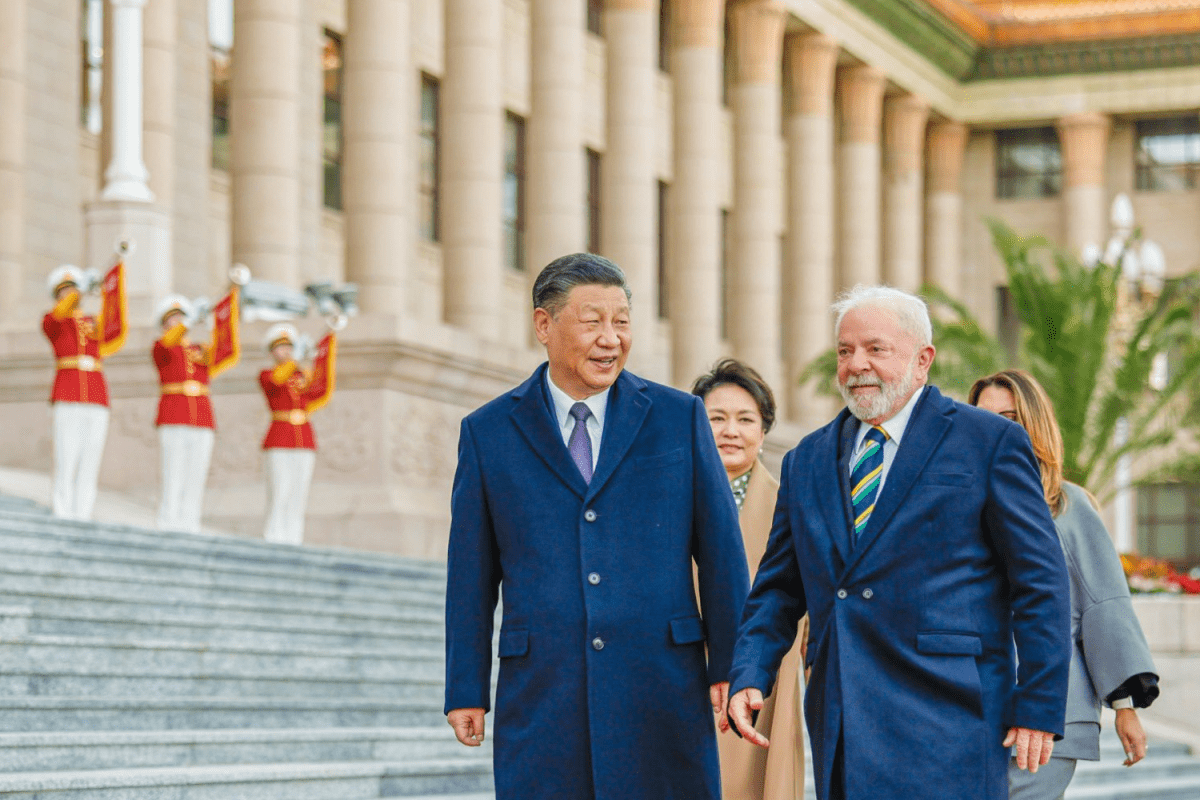When Lula da Silva landed in Beijing, the capital of the People’s Republic of China, on 14 April 2023, he was greeted directly by Chinese President Xi Jinping at Tiananmen Square. Both presidents have long been critical of the U.S. and its support for Ukraine, and in a joint statement, they expressed their belief that compromise is the only way to end the war in Ukraine. Lula Da Silva and Xi Jinping also share an interest in deepening Sino-Brazilian economic relations. However, what has caused the Brazilian president to visit China now?
The Russian invasion of Ukraine has greatly destabilised international relations. Democratic states in Europe, North America and the Indo-Pacific have condemned Russia and begun to support Ukraine militarily or through humanitarian aid. The invasion has caused the homogenisation of ideology and interest of the West, which is currently standing firm against a common enemy. This change is in the interests of the U.S., which for years has been trying to force NATO member states to increase their investment in their armed forces to 2% of their GDP, a goal that was almost unattainable in the past and is currently within reach, as European states have begun to invest huge sums in armaments in response to Russia’s invasion of Ukraine. Another example is the significant improvement in relations and cooperation between South Korea, Japan and the U.S. in an effort to support Ukraine and jointly counter Beijing’s growing power.
On the other hand, Russia’s attack on Ukraine has caused the Global South to distance itself from the U.S. and the West. Most countries in Africa, South America, and Asia were hit hard by the economic problems that emerged as a result of the invasion. The prevailing view in these countries is that the war was caused by the expansion and provocation of NATO, led by the United States. As a result, they are distancing themselves from the West, establishing and deepening relations with the main rivals of the United States: Russia and China. An example is Saudi Arabia, which had been a staunch ally of Washington for many years. However, at an OPEC meeting, in coordination with Russia, it recently negotiated a global reduction in oil production. This move has greatly damaged the U.S. economy and helped the economies of Saudi Arabia and Russia, which are now exporting less oil, albeit at a higher price per barrel. Another example is the disintegration of the French sphere of influence in Africa. Former French colonies such as the Central African Republic, Mali and Burkina Faso have expelled the French army from their territory and have begun to work closely with the Russian Wagner group, who are operating in several countries as mercenaries on the side of governments threatened by Islamist insurgents.
This situation is being exploited primarily by China. Shortly after the end of the ‘zero covid’ policy, Xi Jinping decided to launch a Chinese renaissance. Beijing has thus reopened Chinese society after a long lockdown and has begun to attract foreign investors anew. As a result, the Chinese economy, which had recently been under severe pressure due to the Covid-19 pandemic, has recovered. China has also launched a global diplomatic offensive to improve economic relations, find new security partners and undermine the U.S. position in the world system. Chinese diplomats have targeted a weak spot in U.S. foreign policy: the global South. In the Middle East, they negotiated a breakthrough agreement between Saudi Arabia and Iran to restore their relations, Xi Jinping visited Saudi Arabia, and China deepened its cooperation with Riyadh. In Africa, China has begun to resolve the global debt crisis with local states and has begun to invest more money in the continent. China has used its new influence to form a coalition that supports its proposal for a peace compromise in Ukraine.
The Brazilian president’s visit to Beijing is the latest victory for China’s diplomatic offensive so far. China has long been expanding its influence in South America through economic and security cooperation. Lula Da Silva’s predecessor in office, Jair Bolsonaro, visited Beijing back in 2019. The new wave of leftist governments that have come to power in South America in recent years has brought the continent even closer to China. Leftist governments have refused to join the sanctions against Russia and have begun to openly criticise Washington. The official visit to Beijing of Lula Da Silva, as president of the largest and most important country in South America, and his open support for the Chinese peace plan for Ukraine, shows that the South American continent is coming more and more into China’s sphere of influence. The price for the West’s reunification is thus China’s victory in the Global South for the moment. But the situation may develop differently in the future. Indeed, it is unlikely that current Chinese gains are irreversible. The success of China’s diplomatic offensive depends on the chaos caused by the war in Ukraine, and once it is over, or at least becomes a frozen conflict, the situation will change again. China will lose its advantageous position, and Washington and the West as a whole will once again be able to focus its vast economic, social, and political resources on the global South and will, therefore, likely be able to compete with China. The West is likely to remain united even after the war in Ukraine is over because the bonds of interest and values within the West go beyond the invasion of Ukraine. The U.S. will thus sacrifice temporary losses in the Global South in exchange for long-term gains among its most important allies.
Photo credit: Twitter.com/@LulaOficial/@ricardostuckert


